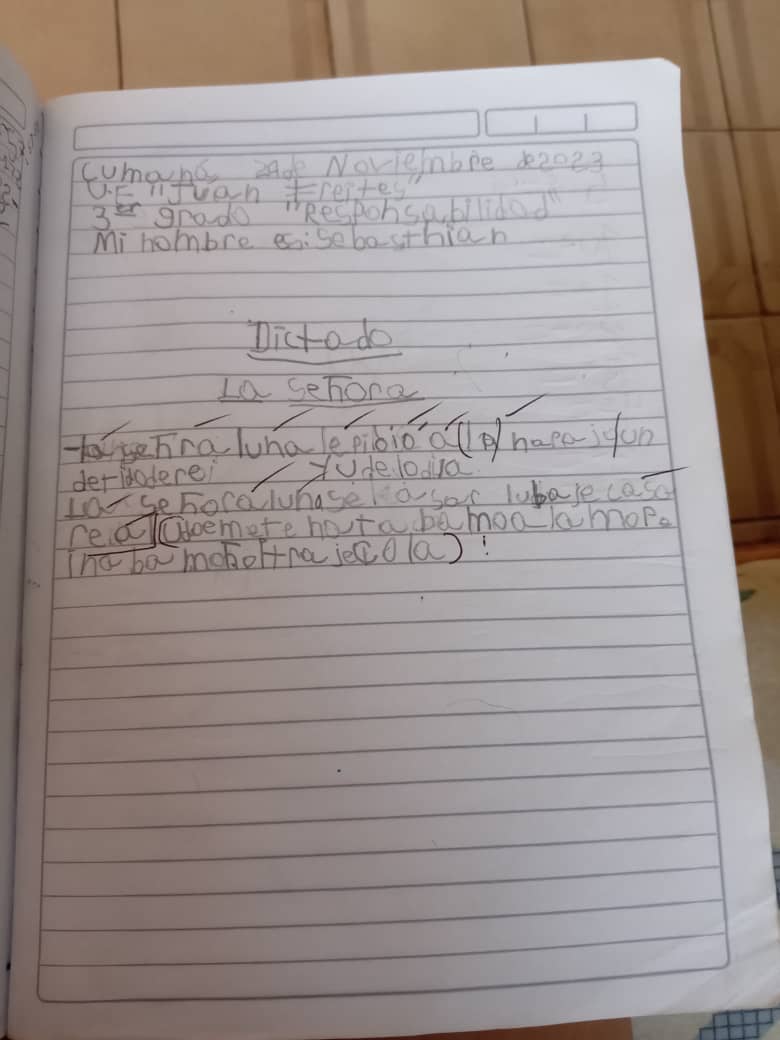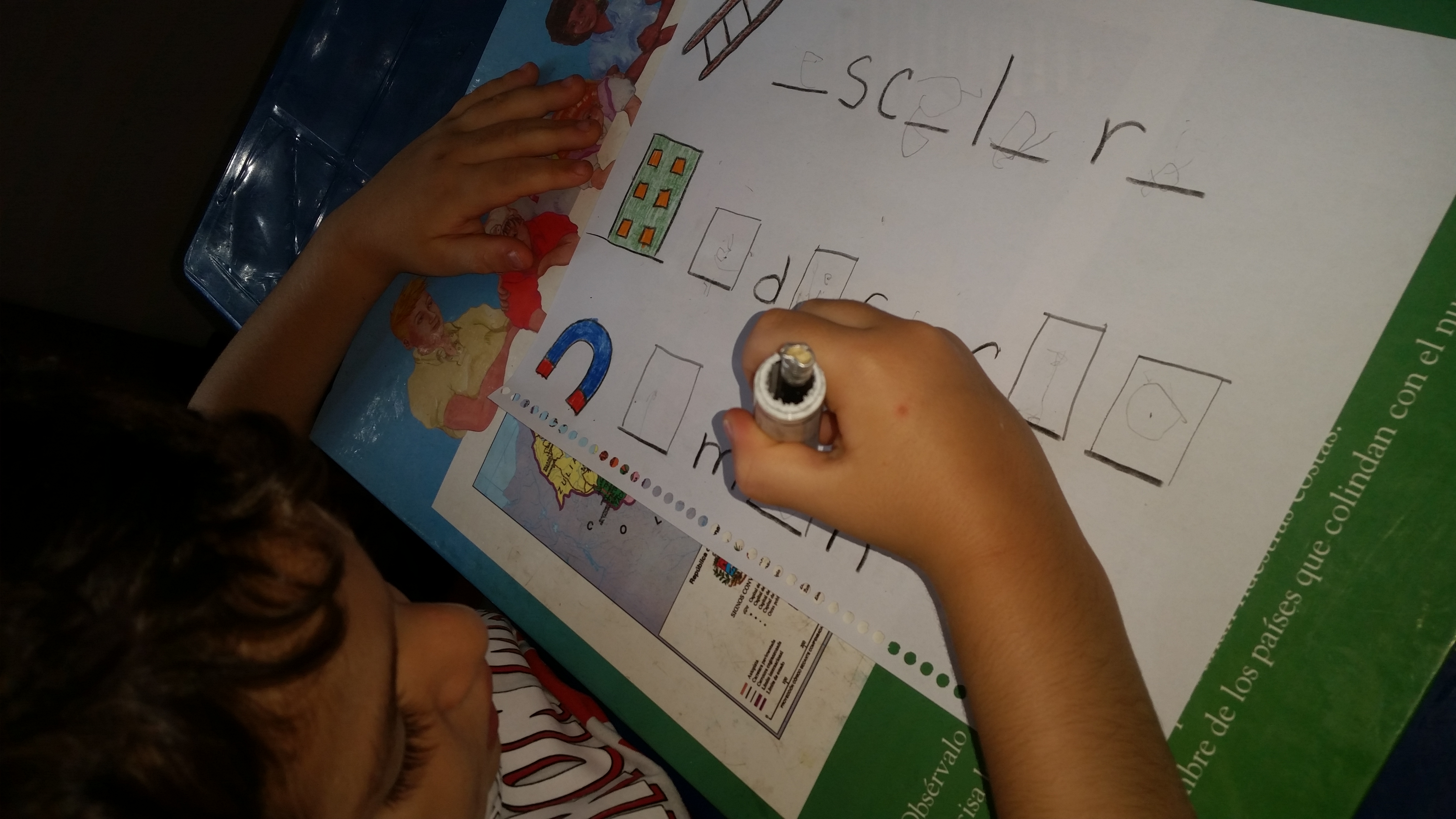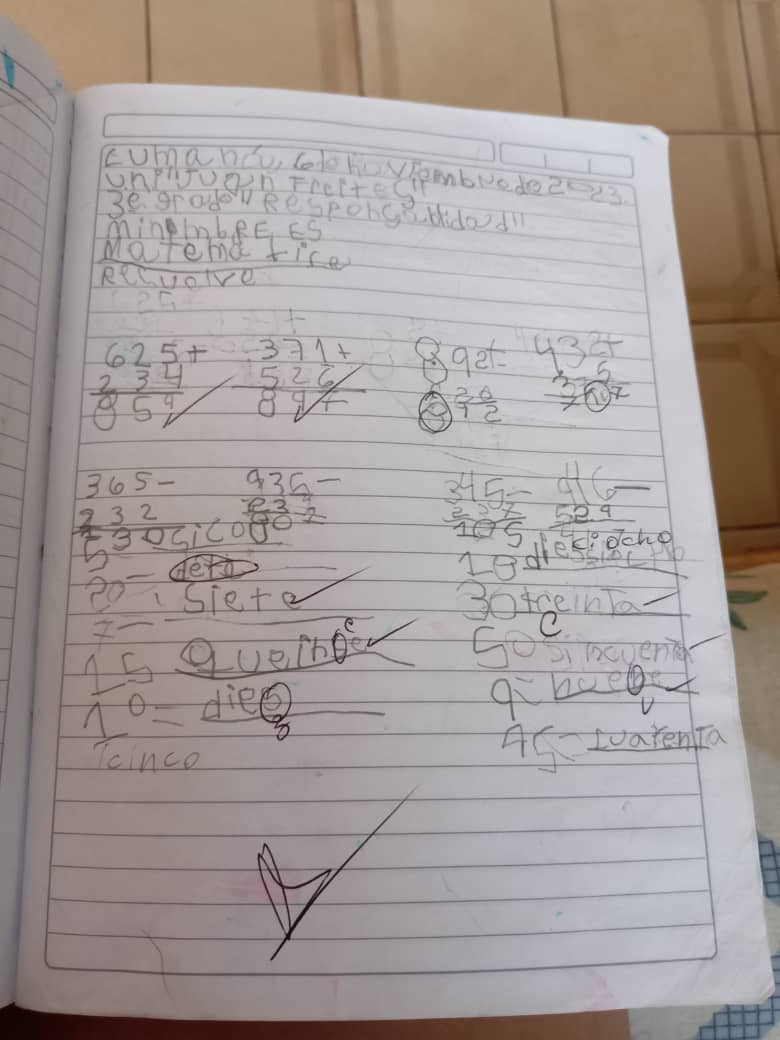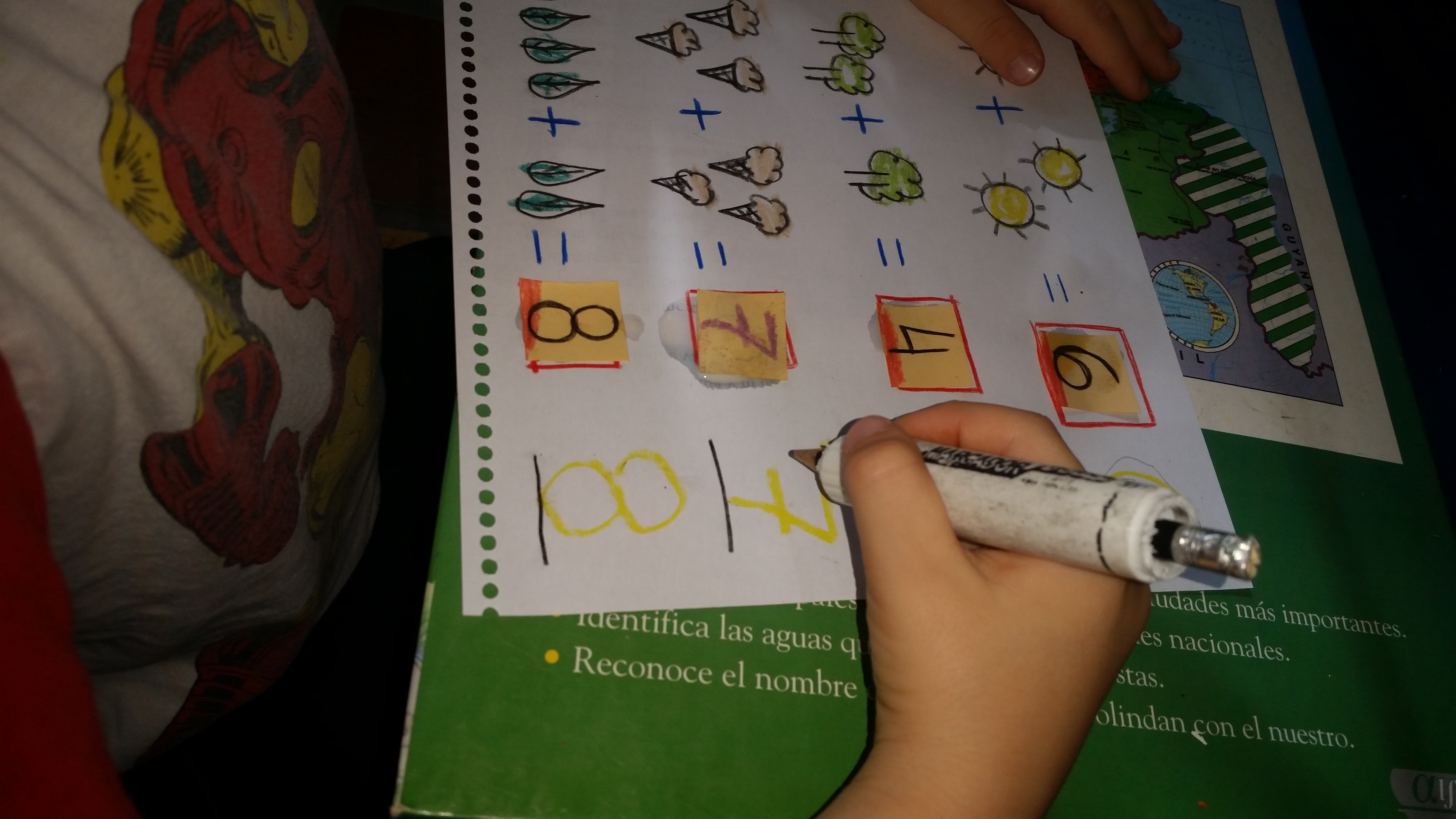Hola a todos, feliz inicio de semana. Hoy es lunes, inicio de actividades escolares. ¡Es mi deseo que todos los niños tengan un recibimiento en cada uno de sus centros escolares que los haga sentir naturalmente incluidos!

El artículo de hoy va dirigido con especial interés a padres y maestros, por cuanto ellos forman una importante comunidad de respaldo y complemento para identificar cuándo un niño necesita apoyo porque las demandas del medio se encuentran más allá de sus posibilidades y recursos personales.

Los trastornos específicos del aprendizaje (lectura, escritura y matemáticas) están caracterizados en el manual de diagnósticos DSM5 como un trastorno del neurodesarrollo que puede aparecer asociado o no a otros trastornos. A pesar de que esta categoría está tipificada en el etapa de desarrollo temprano, donde podemos observar algunas características tanto cognitivas como conductuales, no es prudente apresurar un diagnóstico que va a acompañar al niño por el resto de su vida. Definitivamente antes de los siete años no podemos hacerlo.

Este es el cuaderno de la escuela Sebasthián, 08 años. Diagnóstico de trastorno por déficit de atención con hiperactividad. Está en 3er. grado de educación primaria. Ocho meses de atención psicopedagógica. Cuando inició, identificaba y leía vocales, algunas sílabas, con mucha dificultad. Aún persisten las dificultades de asociación grafema-fonema. No he emitido aún el diagnóstico. Voy a esperar

Sabemos que existen casos en los que los problemas del aprendizaje no aparecen consistentemente sino hasta que las demandas académicas exceden las capacidades limitadas del niño, por lo que en algunas situaciones debemos esperar incluso, hasta más allá de los diez años y después que se ha realizado el protocolo de atención completo, que demanda más de seis meses de intervención psicopedagógica, en forma individual, intensa y frecuente.
A los niños hay que darles las mayores y mejores oportunidades para que superen sus dificultades.
Siempre digo a los docentes, tanto de educación inicial como de primaria, que debe estar muy atentos ante cualquier manifestación que les llame la atención en los niños; y que una observación que piensen que no tiene importancia, podría ser lo que oriente a los servicios de apoyo de la institución a proceder a una evaluación más exhaustiva.
Desde mi experiencia puedo decir que los docentes son excelentes observadores, cuando hacen un señalamiento sobre el proceso de aprendizaje de un niño resulta la punta del iceberg de un problema primario, del cual solo vemos algunas conductas, y gracias a que ellos manifiestan sus dudas, se puede hacer un abordaje que puede dar contención al problema y modificar su pronóstico.

Pablo, primer grado, 06 años. Diagnóstico de trastorno de espectro autista. Cinco meses de atención. Importantes dificultades fonológicas y de lenguaje.

Igualmente los padres son excelentes aliados, nadie como ellos para conocer a sus hijos. Continuamente nos ayudan en la difícil tarea de identificar desviaciones en los procesos de aprendizaje. Es plausible que haya temor y angustia, pues no es fácil aceptar que algo no va muy bien en con el desarrollo; sin embargo, ellos tiene la fortaleza de vencer o acompañar a sus temores para ponerse a la medida de las demandas de cada situación.
Con respecto a esto, y es la premisa fundamental de escribir hoy, quiero comunicarle, a los docentes, pero sobre todo a los padres, que la educación, desde la ciencia, nos ha dado significativas aportaciones y prestaciones que han permitido conocer y poder abordar en forma preventiva y correctiva estas desviaciones, permitiendo al niño retomar su proceso de aprendizaje con apoyos mínimos.

Este es el cuaderno de la escuela Sebasthián, 08 años. Diagnóstico de trastorno por déficit de atención con hiperactividad. Está en 3er. grado de educación primaria. Ocho meses de atención psicopedagógica. Ha mejorado las estrategias de conteo y el cálculo mental.

Lo importante es identificar tempranamente los problemas y remitir a los niños a los a la brevedad posible a los servicios pertinentes.
En este sentido, la psicopedagogía ha creado recursos, estrategias y técnicas provenientes de estudios e investigaciones que tratan de dar respuesta a los trastornos específicos del aprendizaje. Aunque algunos permanecen a la espera de que se determine su causalidad y otros, sabiendo la causa, su total corrección, tenemos mucho camino que recorrer y preguntas a las que estoy segura se le dará respuesta con la ayuda de la sistematización de nuestro trabajo, la puesta a prueba tanto de modelos teóricos como las prácticas que surgen a partir de ellos e igualmente las propuestas que podemos hacer a partir de nuestra experiencia y del trabajo que hacemos a diario con los niños.

Jorge, 07 años, diagnosticado con trastorno del espectro autista, importantes problemas de comunicación y de lenguaje. Está en 2do . grado de educación primaria. Siete meses de atención psicopedagógica.

Así que, estimado padres y docentes, es válido sentir temor, desesperanza y ansiedad ante la presencia de un problema en nuestro niño; pero recuerden que cada día hay más psicopedagogos con formación profesional sólida, que están construyendo su experiencia con responsabilidad y vocación impecable.
Además, se dispone de mayores y mejores recursos para hacer frente a los trastornos específicos del aprendizaje.
Así que hay continuar trabajando y aportando en este campo porque las respuestas pueden estar aguardando para ir a nuestro encuentro, si sabemos buscar, sabiendo que para ello debemos dar pasos que nos acerquen consistentemente a ellas y es la mejor forma que tenemos para dar confianza a los padres y maestros: los niños puedan continuar con su prosecución educativa con mínimos apoyos.

Todas las fotografías forman parte de mi archivo personal, fueron tomadas con mi teléfono Redmi 11. Ahora les dejo la traducción al inglés con ayuda de Google.

Hello everyone, happy start to the week. Today is Monday, the start of school activities. It is my wish that all children have a welcome in each of their schools that makes them feel naturally included!

Today's article is directed with special interest to parents and teachers, since they form an important community of support and complement to identify when a child needs support because the demands of the environment are beyond their personal possibilities and resources.

Specific learning disorders (reading, writing and mathematics) are characterized in the diagnostic manual [DSM5] (https://www.eafit.edu.co/ninos/reddelaspreguntas/Documents/dsm-v-guia-consulta-manual -diagnostico-statistico-distornos-mentales.pdf) as a neurodevelopmental disorder that may or may not appear associated with other disorders. Although this category is typified in the early development stage, where we can observe some cognitive and behavioral characteristics, it is not prudent to rush a diagnosis that will accompany the child for the rest of his or her life. Definitely before the age of seven we cannot do it.

This is the school notebook Sebasthián, 08 years old. Diagnosis of attention deficit hyperactivity disorder. It's in 3rd. primary education degree. Eight months of psycho-educational care. When he started, she identified and read vowels, some syllables, with great difficulty. Grapheme-phoneme association difficulties still persist. I have not issued the diagnosis yet. I'll wait

We know that there are cases in which learning problems do not appear consistently until the academic demands exceed the child's limited capabilities, so in some situations we must wait even beyond the age of ten and after the child has been the complete care protocol, which requires more than six months of psycho-pedagogical intervention, individually, intensely and frequently.
Children must be given the greatest and best opportunities to overcome their difficulties.
I always tell teachers, both initial and primary education, that they must be very attentive to any manifestation that catches their attention in children; and that an observation that they think is unimportant could be what guides the institution's support services to proceed to a more exhaustive evaluation.
From my experience I can say that teachers are excellent observers, when they make a point about a child's learning process it is the tip of the iceberg of a primary problem, of which we only see some behaviors, and thanks to the fact that they express their doubts, An approach can be made that can contain the problem and modify its prognosis.

Pablo, first grade, 06 years old. Diagnosis of autism spectrum disorder. Five months of attention. Significant phonological and language difficulties.

Likewise, parents are excellent allies, no one like them when it comes to getting to know their children. They continually help us in the difficult task of identifying deviations in the learning processes. It is plausible that there is fear and anguish, since it is not easy to accept that something is not going very well with development; However, they have the strength to overcome or accompany their fears to adapt to the demands of each situation.
With respect to this, and it is the fundamental premise of writing today, I want to communicate to teachers, but above all to parents, that education, from science, has given us significant contributions and benefits that have allowed us to know and be able to address preventive and corrective these deviations, allowing the child to resume their learning process with minimal support.

This is the school notebook Sebasthián, 08 years old. Diagnosis of attention deficit hyperactivity disorder. It's in 3rd. primary education degree. Eight months of psycho-educational care. When he started, he identified and read vowels, some syllables, with great difficulty. Grapheme-phoneme association difficulties still persist. I have not issued the diagnosis yet. I'll wait

We know that there are cases in which learning problems do not appear consistently until the academic demands exceed the child's limited capabilities, so in some situations we must wait even beyond the age of ten and after the child has been the complete care protocol, which requires more than six months of psycho-pedagogical intervention, individually, intensely and frequently.
Children must be given the greatest and best opportunities to overcome their difficulties.
I always tell teachers, both initial and primary education, that they must be very attentive to any manifestation that catches their attention in children; and that an observation that they think is unimportant could be what guides the institution's support services to proceed to a more exhaustive evaluation.
From my experience I can say that teachers are excellent observers, when they make a point about a child's learning process it is the tip of the iceberg of a primary problem, of which we only see some behaviors, and thanks to the fact that they express their doubts, An approach can be made that can contain the problem and modify its prognosis.

Pablo, first grade, 06 years old. Diagnosis of autism spectrum disorder. Five months of attention. Significant phonological and language difficulties.

Likewise, parents are excellent allies, no one like them when it comes to getting to know their children. They continually help us in the difficult task of identifying deviations in the learning processes. It is plausible that there is fear and anguish, since it is not easy to accept that something is not going very well with development; However, they have the strength to overcome or accompany their fears to adapt to the demands of each situation.
With respect to this, and it is the fundamental premise of writing today, I want to communicate to teachers, but above all to parents, that education, from science, has given us significant contributions and benefits that have allowed us to know and be able to address preventive and corrective these deviations, allowing the child to resume their learning process with minimal support.

This is the school notebook Sebasthián, 08 years old. Diagnosis of attention deficit hyperactivity disorder. He is in 3rd. primary education degree. Eight months of psycho-educational care. He has improved counting strategies and mental calculation.

The important thing is to identify problems early and refer children to the relevant services as soon as possible.
In this sense, psychopedagogy has created resources, strategies and techniques from studies and research that try to respond to specific learning disorders. Although some remain waiting for their causality to be determined and others, knowing the cause, its complete correction, we have a long way to go and questions that I am sure will be answered with the help of the systematization of our work, the testing both theoretical models and the practices that arise from them and also the proposals that we can make based on our experience and the work we do daily with children.

Jorge, 07 years old, diagnosed with autism spectrum disorder, significant communication and language problems. He is in 2nd. primary education degree. Seven months of psychopedagogical attention.


Jorge, 07 years old, diagnosed with autism spectrum disorder, significant communication and language problems. He is in 2nd. primary education degree. Seven months of psychopedagogical attention.

So, dear parents and teachers, it is valid to feel fear, hopelessness and anxiety in the presence of a problem in our child; But remember that every day there are more psychopedagogues with solid professional training, who are building their experience with responsibility and impeccable vocation.
In addition, more and better resources are available to address specific learning disorders.
So we must continue working and contributing in this field because the answers may be waiting to come to us, if we know how to search, knowing that to do so we must take steps that consistently bring us closer to them and it is the best way we have to give confidence to parents and teachers: children can continue with their educational pursuit with minimal support.

All the photographs are part of my personal archive, they were taken with my Redmi 11 phone. Now I leave you the English translation with the help of Google.

!ALIVE
Has sido curado por @visualblock / You've been curated by @visualblock
Bienvenidas delegaciones / Delegations welcome
Trail de Curación / Curation Trail
Vota por nuestro Testigo aliado - @hispapro / Vote for our allied Witness - @hispapro
Más información sobre el testigo aquí / More information about the witness here
Su publicación ha sido votada por @Edu-venezuela, se trasladará a otros proyectos de curación para obtener más apoyo. ¡Continúe con el buen trabajo!
Gracias por usar la etiqueta #edu-venezuela
¡Bienvenidas las Delegaciones / Welcome Delegations
Trail de Curación / Curation Trail
Saludos @sandracabrera. Gracias por traernos información de gran relevancia. Es alentador contar con tu dedicación como docente especialista 💙
Agradecida.
Feliz noche @mundo.autismo
Saludos, bienvenida y feliz año @sandracabrera, que gusto tenerla de vuelta.
Saludos y muchos logros en la continuación de este año escolar. 😊
@tipu curate 4
Sorry, please curate posts not older than 1 day.
Que bonito el trabajo que haces, a mí me gustaría estudiar psicología para ayudar a los adolescentes en un futuro.
Saludos.
Gracias, @ambarprincess.
Si te lo propones, lo puedes lograr.
El trabajo con adolescentes es muy intensamente porque es una población con mucha vulnerabilidad desde el punto de vista de su desarrollo, por sus cambios físicos y socio emocionales.